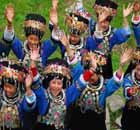Economy
Hawaii bid for Chinese tourists hurt by air access
(Agencies)
Updated: 2009-12-03 10:46
The Las Vegas Convention and Visitors Authority also is eying Hainan, said John Bischoff, a vice president with the organization. The authority may be interested in a deal in which Hainan passengers stop in Hawaii on their way to Las Vegas or during their return to China, he said.
The Chinese tend to travel to the United States for multiple weeks, so it is to the advantage of US tourism officials to cooperate on tour packages and travel agent training, Bischoff said.
But Hawaii's tourism industry knows it needs to make the islands more culturally inviting to the Chinese. Many hotels, restaurants and retail stores have offered Japanese-speaking clerks for years, along with signs and menus in Japanese. Such aid is infrequently provided in Mandarin.
At the request of the Hawaii Tourism Authority, Kapiolani Community College, just outside the tourist hub of Waikiki, has begun offering classes in basic Chinese phrases and customs to travel industry employees.
"What we're really doing with China is sort of just scratching the surface a little bit deeper ... and (trying) to get to the level of comfort we presently have with our Japanese visitors," said Barry Wallace, executive vice president for Outrigger hotels.
California drew 237,000 Chinese visitors last year. State and local tourism officials are meeting counterparts in China and offering new travel packages that brand the Golden State as a "dream destination."
Las Vegas' marketing efforts focus less on gaming, since the Chinese can travel easily to the Chinese administrative district of Macau for that, said Bischoff. Instead, Vegas highlights entertainment and sightseeing attractions, including the Grand Canyon Skywalk 122 miles away, which was built by a Chinese-American businessman.












